Artist, author, and lecturer Louis Nizer (1902-1994) once said, “A man who works with his hands is a laborer; a man who works with his hands and his brain is a craftsman; but a man who works with his hands and his brain and his heart is an artist.”
At the American College of the Building Arts (ACBA), in Charleston, artisans are trained to foster exceptional craftsmanship and preservation. As ACBA’s founders considered how best to create a new institution to educate the next generation of highly skilled craftspeople, they looked toward the academic model found at France’s Compagnons du Devoir.
With a history that dates to the Middle Ages, Les Compagnons is a 10-year academic program during which students travel throughout the country completing apprenticeships with master artisans. ACBA then condensed the French program into a four-year American curriculum in which educational methods are rooted in the medieval guild system.
A rarity for academic institutions in the United States, ACBA offers a unique bachelor’s degree integrated with a liberal arts core curriculum that prepares graduates for a successful future doing something they love. In addition to general education classes, students spend 10 to 15 hours a week in the trade workshops and working one-on-one with experienced mentors to learn the artistry and hands-on skills of their craft.
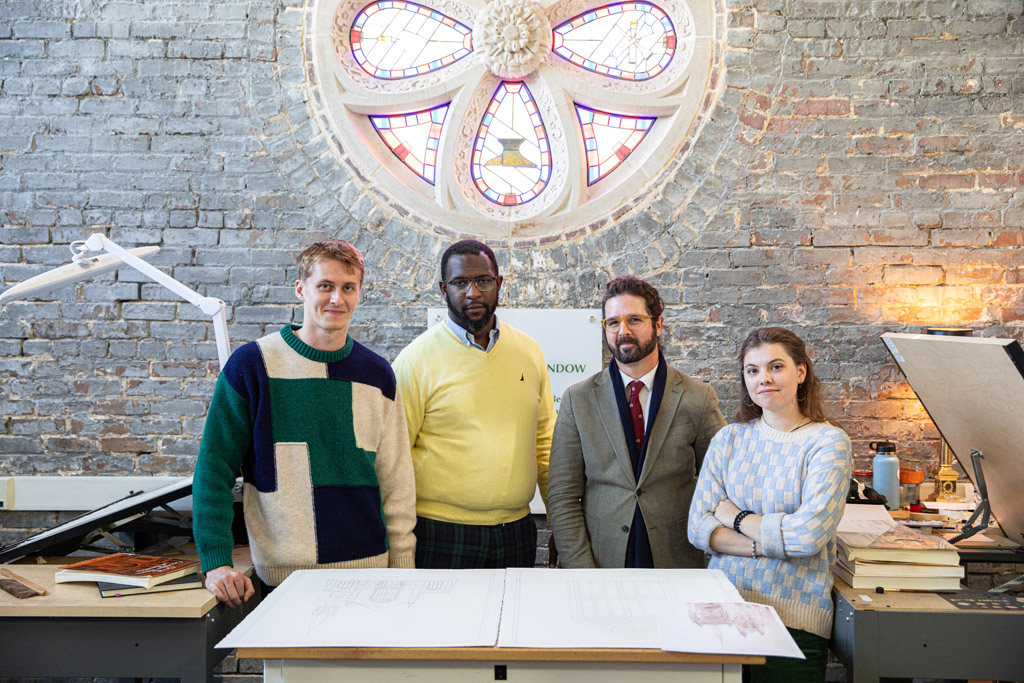
ACBA senior, Michael Vanderlip; Assistant Professor of Classical Architecture and Allied Arts, Phillip Smith; Chair of Classical Architecture and Design, Professor Jack Duncan; and ACBA junior, Grace Malcom;
Students are individually guided by renowned professors who are committed to developing artisans to carry on the time-honored traditions of their trades. They include award-winning craftspeople from England, France, and Germany who have worked on historic properties throughout America and Europe. Many own their own companies, which requires them to stay well-informed on the latest trends and technologies in their fields.
“We combine a four-year liberal arts college education with a trade education, and that is unique,” said Master Carpenter Markus Damwerth, chair of Architectural Carpentry. “It’s not only about learning the trade. They also learn all the background: material sciences, leadership, how to set up a business plan, how to organize a business.”
The techniques Professor Damwerth teaches date back to the Romans and are visible throughout much of the historic architecture of Europe. “Traditional architectural carpentry is woodworking without a nail gun,” he said. “We always use techniques that fit the natural material, and wood is special. Wood moves. It has a certain cell structure, so you must know about the material and the joinery which you could use.”
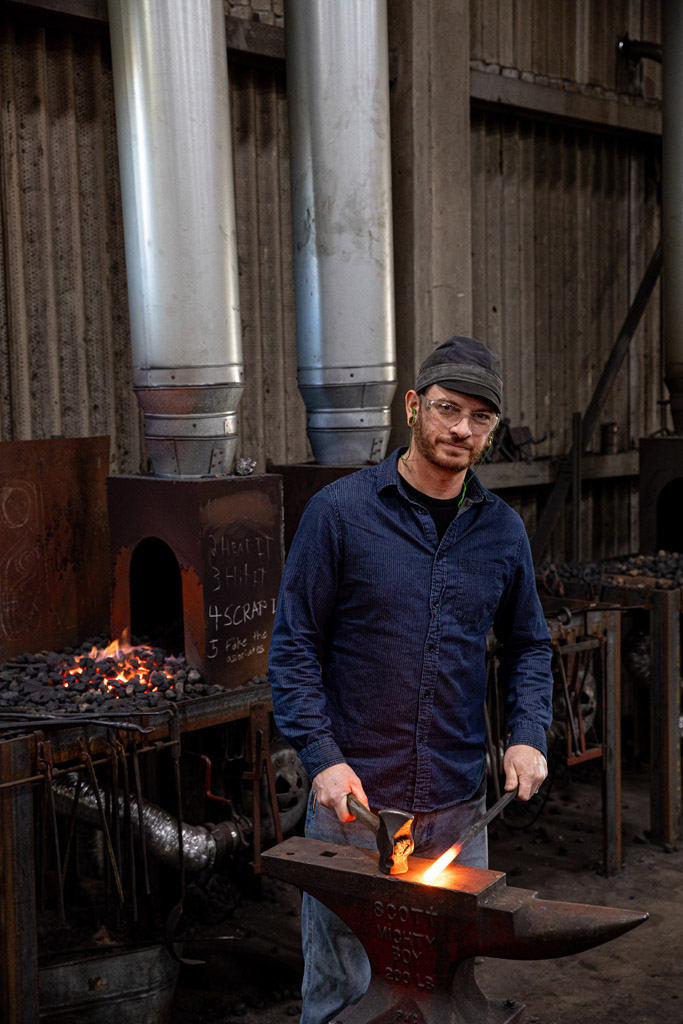
ACBA Professor of Blacksmithing, Abe Pardee;
Students can earn a Bachelor of Applied Sciences degree in one of the following specializations: architectural carpentry, timber framing, blacksmithing, plaster, architectural stone, and classical architecture and design. Conversely, students can receive an Associate of Applied Science degree in the fundamentals of architectural carpentry and timber framing, blacksmithing, plaster, or architectural stone.
“ACBA graduates understand not only how to do something, but also how to develop the creative thinking and problem-solving skills that great artisans need,” said Colby Broadwater, president of the American College of the Building Arts.
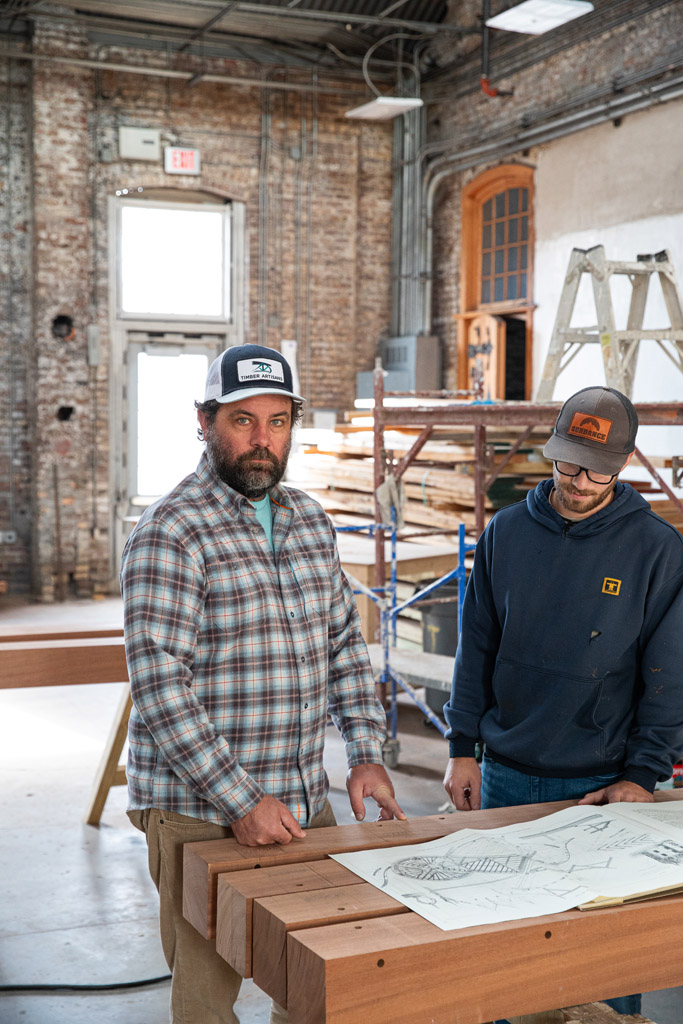
Professor Bruno Sutter, Chair of Timber Framing, and senior timber framing student at ACBA, Brock King;
To expand their skills and gain valuable real-world experience, all students complete summer externships both nationally and internationally between each academic school year. These externships have provided opportunities for ACBA students to repair windows in the Oval Office of the White House; work on the Capitol Dome in Washington, D.C.; replicate outbuildings at George Washington’s Mount Vernon estate; work on Lincoln Cathedral in England; and study under master blacksmiths in Japan and Italy. Apart from providing real-world shop experience, these externships also offer students valuable networking contacts.
Penn Center, the campus of the former Penn School located on St. Helena Island in Beaufort County, is one of the nation’s first schools for formerly enslaved people and one of the most significant African American institutions in existence today. Phillip D. Smith, an assistant professor of classical architecture and allied arts at ACBA, has forged a relationship with the Penn Center which facilitates the participation of ACBA students in their summer student residency program. In the summer of 2023, two ACBA students attended the program and Smith led a walking tour that highlighted the 50-acre campus, which includes 25 historic buildings and structures.
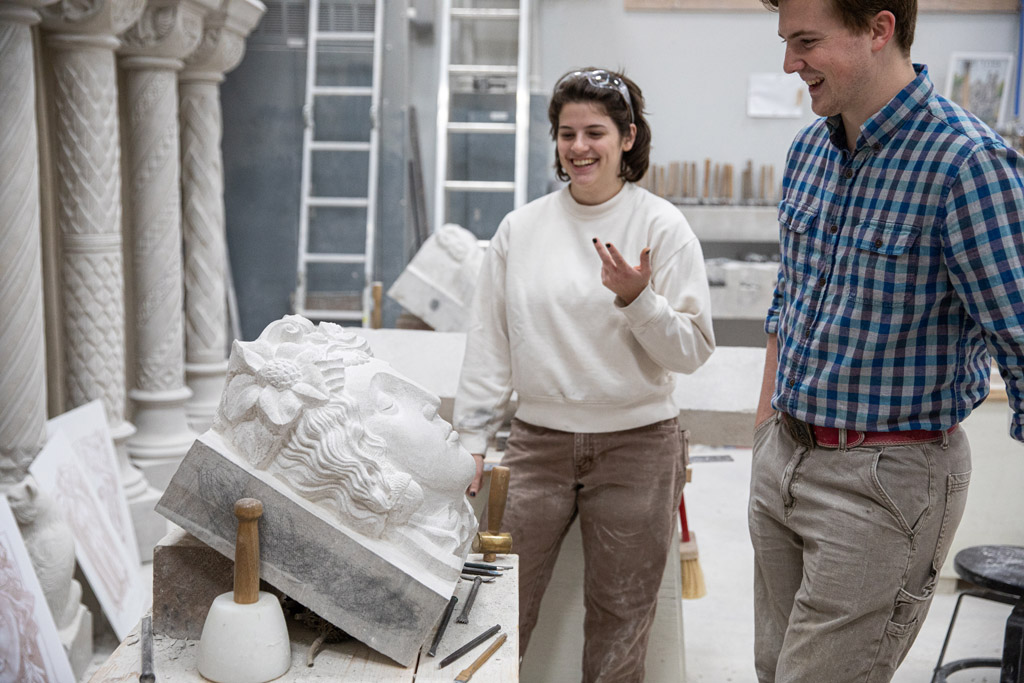
ACBA stone alumni, Iris Howe and Cameron Smith
Today, Smith is working in conjunction with Charleston-based Innova Architecture on preservation work of the historic buildings.
“The legacy of Penn Center is built upon both the traditional and vocational education of students, and the direct connection between the method of education the students at Penn School received in 1862 and how we continue to educate students at ACBA, today.” Smith said.
Given Beaufort County’s proximity to Charleston, ACBA continues to forge meaningful relationships there to expand its mission and impact. John Trask, a lifelong resident of St. Helena who works in real estate and development, recently joined the board of ACBA.
“Under the leadership of Pierre Manigault, Colby Broadwater, and many other talented people, the American College of the Building Arts has created a bedrock foundation. By becoming a fully accredited college, by recruiting and retaining top tier professors and instructors, by not having a tuition increase in almost 20 years of existence, and by developing a board of directors who are willing to roll up their sleeves–ACBA is primed for the future. It is very exciting for me to be a part of this fine institution,” Trask said. “We can grow our student body just as we are currently growing our facilities. The story of the genesis of the college and achieving the success that it has is compelling and one that will not only attract more students but will surely attract a larger donor base and recognition.”
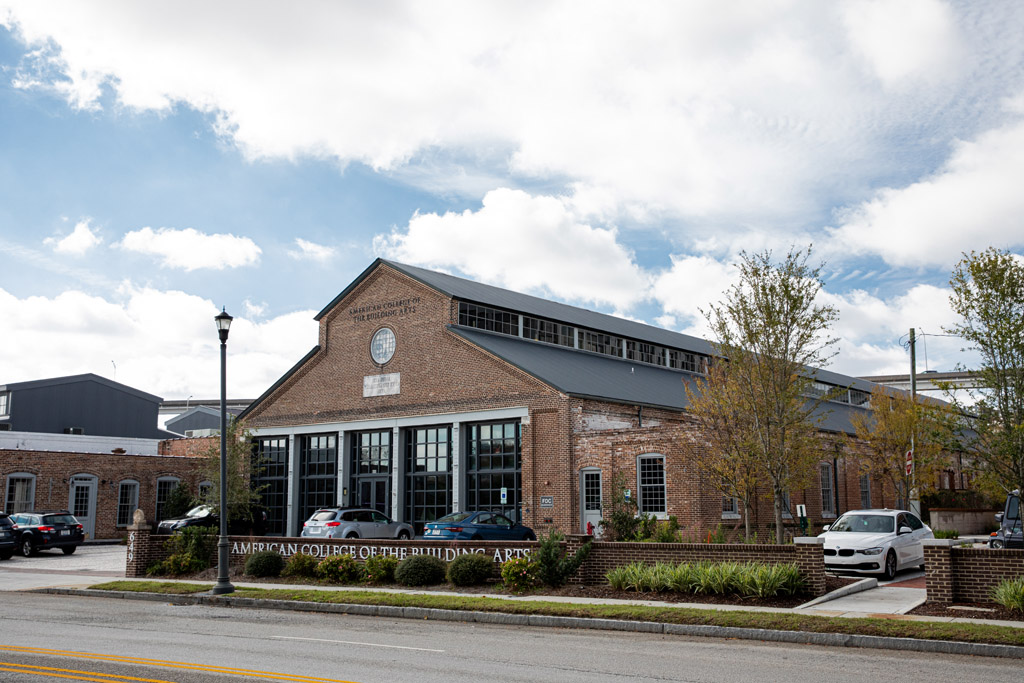
Having outgrown its previous facilities, ACBA launched a major fundraising effort in 2014 to establish a single, expanded campus that could consolidate the teaching of all trades under one roof. With a major donation from Parallel Capital and from Russell and Betty Joan Hitt, founders of Virginia-based HITT Contracting, early supporters of ACBA, the college raised funds to purchase and renovate the abandoned Charleston Trolley Barn on Upper Meeting Street;
Trask’s son, Peter, graduated from ACBA in May of 2023 with a focus in architectural carpentry. Peter chose ACBA because of its unusual balance between academics and hands-on craftsmanship. Peter is currently working for Brooks Custom Woodworks, based on Sullivan’s Island.
According to the National Trust for Historic Preservation, “Beginning in the late 20th century, the last generation of highly skilled tradespeople with the knowledge and experience of old-world craftsmanship began aging out of the job market, with no new generation being trained to take their place.”
ACBA’s mission is to change that.

